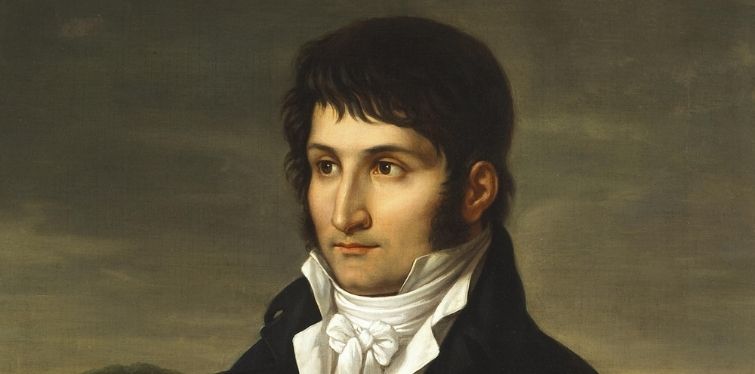After a brief interval to mark the 200th anniversary of Napoleon’s death in Saint Helena, we return our blog series on Napoleon’s brothers. This time, we turn to Lucien, the only Bonaparte brother not to be given a crown. More than anyone else, he had enabled his brother’s seize of power in 1799 and helped consolidate the consulate, but the independent-minded and principled Lucien soon distanced himself from his brother’s increasingly imperial ambitions.
Lucien Buonaparte was born in Ajaccio on 21 May 1775, the third son of Carlo and Letizia Buonaparte. As such, he was considerably younger than his older brothers Joseph (1768) and Napoleon (1769) and was therefore not as close to Napoleon as Joseph. Nevertheless, his education and upbringing followed a similar path to this elder brothers. Like Napoleon, Lucien was expected to join the army and studied at the military college at Brienne, but the death of their father in 1786 led him to seek a career in the church. In 1789, after three years at the seminary in Aix-en-Provence, Lucien realised he had no interest in becoming a clergyman and left on the eve of the Revolution.
The outbreak of Revolution in Paris led the Bonaparte brothers to return to Corsica, where they hoped to gain favour with their hero Pasquale Paoli, who had returned to wide acclaim amidst the revolutionary fervour. By 1791 Lucien was working as Paoli’s secretary, taking on the same role as his father more than two decades earlier. It soon became clear that Lucien and Paoli were not on the same page. In his memoirs, Lucien described how as a teenager he “ran to throw himself into the popular societies with the lively enthusiasm of a youthful and ardent head, filled with the remembrances of college, and the great names of Rome and Greece.”
While Lucien was an active member of the radical Jacobin club, Paoli was telling the young man of his admiration for England, where he had spent more than two decades in exile: “England, ” said he, “is not a monarchy: it is a wise and powerful republic: happy would it be for France if she would take England for her model.” Lucien, who had been brought up a Frenchman, was taken aback by these Anglophile sentiments. Witnessing the increasing violence of the Revolution, Paoli gradually turned against France. Following the execution of King Louis XVI, Paoli gave the Bonapartes an ultimatum: “The brothers must decide: they must choose between France and me.” Lucien and his brothers chose France.

Pasquale Paoli
By April 1793 Paoli openly broke with the revolutionary government and in the following year the Anglo-Corsican Kingdom was formed under the protection of the Royal Navy. The Bonaparte family was forced to flee into southern France and settled in Marseille, where Lucien denounced Paoli as a traitor. Barely eighteen, he served the revolutionary government in local administrative posts in southern France. While Lucien’s Jacobinism might have been down to youthful exuberance, Joseph and Napoleon also came to be supporters of Robespierre and were the beneficiaries of their patronage. This is not to say the Bonapartes were enthusiastic supporters of the terror, and it served them well to be away from Paris.
In July 1794 the Coup of 9 Thermidor removed Robespierre from power and sent him to the guillotine, and during the ensuing reaction, the Jacobins and their supporters were hunted down. In 1795 Lucien was arrested and imprisoned in Aix for six weeks and it was only the intervention of Napoleon, by now a close acquaintance of Paul Barras, one of the leading figures of government, that Lucien was released.
Napoleon’s intervention to suppress the rising of 13 Vendemiaire (October 1795) was rewarded by the command of the Army of the Interior, and Lucien soon joined his brother in Paris after being named commissary of war in General Moreau’s Army of the North. In the summer of 1796, with Napoleon having already begun his famous First Italian Campaign, he obtained permission to join his brother in Italy before leaving for a posting in his native Corsica. By this time French forces had gained the upper hand and Paoli was once again forced into British exile.
In 1798, Lucien had been asked by Napoleon to accompany him on his Egyptian campaign, but had instead been elected to the Council of Five Hundred representing the department of Liamone in Corsica. Joseph Bonaparte had already been a member since the previous election. As a deputy Lucien was initially supportive of the Directory, the five man body which exercises the executive functions of the French government. Within a few months, Lucien turned against the Directory over issues of foreign policy and taxation.
By the summer of 1799 French armies were suffering reverses in Germany and Italy, as Russian Field Marshal Suvorov’s Austro-Russian army won a lightning campaign to re-establish Austrian control of northern Italy. Meanwhile, Napoleon’s initially successful campaign in Egypt had met with a series of reverses. In the midst of these setbacks, the government in Paris struggled to survive. Lucien was named to an eleven member extraordinary commission to examine the causes of these setbacks. Presenting its findings to the Council of the Five Hundred, Lucien concluded that the fault lay with the corruption within the Directory. These conclusions were subsequently accepted by both houses of legislature, forcing the members of the Directory to resign. The constitutional theorist Emmanuel Joseph Sièyes became the most influential member of the new Directory, and Lucien became an enthusiastic supporter of his project to reinvigorate the Republic.
Sièyes had hoped to strengthen the executive by replacing the Five man directory with a three man consulate, each of whom would assume the presidency of the body for a year before passing on the office to one of their colleagues. Sièyes knew that the plan would be resisted by the Council of the Five Hundred, where the Jacobins had a majority. To realise his vision Sièyes sought for support from the army. His initial candidate, General Joubert, had been killed at the Battle of Novi in August 1799. He tried in vain to persuade General Jourdan, a moderate Jacobin, to support his cause. Only when General Bonaparte returned unexpectedly from Egypt did Sièyes have a fellow conspirator, and not a particularly welcome one.
The Brumaire Coup duly took place on 9-10 November 1799, though not as Sièyes had envisaged. In the official version of events proclaimed by Napoleon and Sièyes, Lucien played only a minor role on the sidelines. In fact Lucien, who had been elected to the Presidency of the Five Hundred in October, had played a major part in the events. On 9 November, he falsely spread rumours about a Jacobin plot in Paris and used this pretext to move the legislative bodies to the Palace of St Cloud to the west of Paris. This brought the conspirators time to dissolve the Directory and announce the establishment of a new government. On 10 November, Lucien announced the fait accompli to the Five Hundred and a heated debate broke out. At this point an irritated Napoleon unexpectedly stormed into the hall and urged the legislators to approve the seizure of power.
The majority of the deputies resisted Napoleon’s efforts and called him an outlaw. It was at this point that Lucien is supposed to have theatrically laid down his presidential regalia and pointed a sword at his brother, announcing that if Napoleon sought to become a tyrant he would be the first to strike him down. While Napoleon beat a hasty retreat, Lucien ordered grenadiers into the hall under the pretext of self-defence, and opposition legislators were driven out. For the remainder of the day Lucien attempted to cobble together the remaining legislators sympathetic to the coup to agree the transfer of power to a provisional Consulate.

General Bonaparte at the Council of Five Hundred
The government that emerged following the coup bore little resemblance to Sièyes’s plan. Instead, Napoleon had established himself as the government’s leading figure. Despite his misgivings, Lucien supported his brother’s government. At the end of 1799 he was named Minister of the Interior, replacing the mathematician Pierre-Simon Laplace who had proved an ineffective appointment. In this capacity he had considerable influence over local government, policing, and education, but most notably he was responsible for falsifying the referendum over the Constitution proposed by the new consuls.
Already in 1800 Lucien began to fall out with Napoleon. In November 1800, he published an ‘anonymous’ pamphlet supporting the Consulate but making some comparisons between Napoleon and the dictatorship of Caesar. Napoleon duly dismissed Lucien from his ministerial post and made him ambassador to Spain. In this capacity he negotiated the Treaty of Aranjuez with Spanish chief minister Manuel Godoy, which restored the territory of Louisiana to France in return for an Italian kingdom for the Spanish king’s son-in-law. Lucien was also tasked with negotiating an alliance with Portugal but settled for the cession of extensive territories in Brazil. Lucien’s conduct of both sets of negotiations were criticised by Napoleon, who claimed that he had been bribed by the Portuguese and recalled him in late 1801.
Having been employed as a minister and a diplomat by his brother, in 1802 Lucien resumed his seat in the Tribunate, a body which deliberated over proposed laws. Lucien worked on two major projects, the establishment of the Legion d’Honneur and the Concordat with Rome, which restored relations between France and the Catholic Church broken by the Revolution. Lucien had also introduced the writer François-René de Chateaubriand to Napoleon. Chateaubriand, who had authored a defence of Christianity during the Revolution, was co-opted by Napoleon into the project of brokering an agreement with Rome.
The same year, Lucien married his second wife, Alexandrine de Bleschamp, the widow of the banker Hippolyte Jouberthon who had died that year. Lucien’s first wife Christine, the daughter of an innkeeper, had died in 1800 after bearing him two children. Napoleon had opposed to both of Lucien’s marriages. In 1803 Napoleon was already thinking in dynastic terms and hoped that Lucien would divorce his wife and marry the recently widowed Infante Maria Luisa, daughter of King Charles IV of Spain. Lucien refused to do so and in 1804 left Paris for Rome, where he was welcomed by Pope Pius VII.
While in Rome, Lucien devoted himself to scientific and archaeological studies, continuing to resist Napoleon’s imperial ambitions in public while seeking reconciliation (and a place in the imperial line of succession) in private. In 1807, with Napoleon preparing to invade Portugal, the two brothers met once again at Mantua. Napoleon offered Lucien a host of crowns in Italy, Spain, and Portugal on the condition that Lucien divorce his wife or at the very least to allow his daughter to marry Crown Prince Ferdinand of Spain (Readers might recall Napoleon had also intended Joseph’s daughter as a potential bride). Lucien refused all these offers and returned to Rome.
In February 1808, following several years of increasing tension between Napoleon and the Pope over the implementation of the Concordat, Pius refused to invest bishops appointed by Napoleon. This prompted the Emperor sent an armed force to invade the papal states. Lucien sided with Pius and made a show of defiance against his brother’s soldiers, and was rewarded with the principality of Canino. In a letter to Joseph, Napoleon wrote, “Lucien is misconducting himself at Rome, even going so far as to insult the Roman officers who take my side, and is more Roman than the Pope himself.”

Lucien Bonaparte, Prince of Canino, c. 1808
While the Pope was arrested and eventually brought to France, Lucien sought to escape to the United States but was intercepted by the Royal Navy. From 1810 to 1814 he resided at Thorngrove House in Worcestershire. Theoretically under house arrest, Lucien became an English country gentleman and entertained many guests. He also wrote several theatrical works and an epic poem Charlemagne ou L’Eglise Deliverée, both to supplement his income and to communicate his ideas about the relationship between the Emperor and the Church.
While in British exile, Lucien began to embrace the principles of British constitutional monarchy which he had so many years ago been disgusted to hear from Paoli. Nevertheless, he was not keen on being a prisoner and upon Napoleon’s defeat in 1814 he was allowed to return to Rome. In 1814 the Pope confirmed him as hereditary prince of Canino, and ten years later also made him Prince of neighbouring Musignano.
When Napoleon escaped from Elba in 1815, he announced his intention to rule with a liberal constitution. Lucien accepted his brother’s invitation to return to Paris, and the longed-for reconciliation was effected on 9 May. Lucien was given the title Prince Français but he and his children remained excluded from the imperial succession. He became a member in both the Chamber of Deputies (by election) and the Chamber of Peers (by appointment). Following Napoleon’s defeat at Waterloo, Lucien tried in vain to persuade dissuade the legislators from abandoning Napoleon’s cause, prompting the venerable Marquis de Lafayette to observe that “That nation has followed his bloody footsteps through the sands of Egypt and through the wastes of Russia; over fifty fields of battle; in disaster as faithfully as victory; and it is for having thus devotedly followed him that we now mourn the blood of three millions of Frenchmen.” On 23 June, Napoleon asked Lucien to write the Act of Abdication in favour of his son, the four year old Napoleon II. The legislators, knowing that this would be unacceptable to the victorious allies, kept their options open.
With Napoleon out of power and destined to spend his final days in Saint Helena, Lucien was allowed to return to Rome so long as he remained in the Papal States. Besides his immediate family, he was able to enjoy the company of his mother, his brother Louis, and his sister Pauline, all of whom were also in Rome. For the remainder of his life Lucien dedicated himself to writing his memoirs (of which only the first part has been published), and to archaeological studies of the extensive Etruscan remains on the grounds of his estate in Canino. In 1833 he briefly met his brother Joseph in London to discuss the political ambitions of the Bonaparte family and to seek to return to France, but Joseph thought this was unrealistic and nothing came of the meeting. Aged 65, Lucien Bonaparte died at Viterbo on 29 July 1840 of stomach cancer, the same disease which had killed Napoleon almost 20 years earlier.
If you enjoyed this blog post take a look at our Lucien Bonaparte cartoon mug!




Share and get 15% off!
Simply share this product on one of the following social networks and you will unlock 15% off!